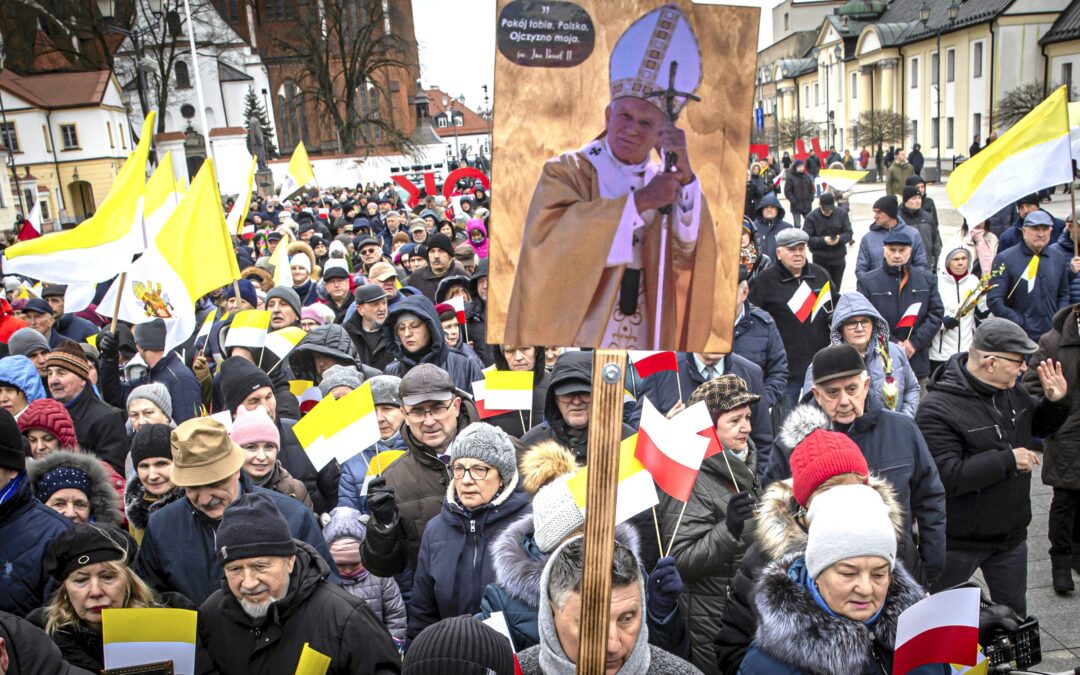Tens of thousands of people joined marches around Poland today in honour of Polish Pope John Paul II on the 18th anniversary of his death. This year’s commemorations took on particular size and significance due to recent media reports suggesting the pope was negligent in dealing with cases of clerical sex abuse.
Among those to take part in the processions were leading government figures. Ahead of the anniversary, Jarosław Kaczyński, chairman of the ruling party, issued a message warning that attempts to undermine the pope’s legacy are part of “social engineering” designed to make Polish society more easily “externally controlled”.
As well as those coming out in support of John Paul II, this weekend also saw isolated cases of vandalism against memorials to him.
MARSZ PAPIESKI
Warszawa – Jesteśmy z Tobą Ojcze Święty!@KlubyGP @GPtygodnik @GPtygodnik @niezaleznapl @TomaszSakiewicz pic.twitter.com/T1aZANjAed— Kluby "Gazety Polskiej" (@KlubyGP) April 2, 2023
At the largest march, in Warsaw, Tomasz Sakiewicz, the editor of a conservative newspaper, Gazeta Polska, that had helped organise and promote the event, claimed attendance of 200,000. However, two far-right leaders – Krzysztof Bosak and Robert Bąkiewicz – estimated there were tens of thousands present.
In the cities of Lublin, Białystok and Wrocław, thousand joined marches. In Kraków, police estimate that 10,000 people took part in one march in honour of the former pope and 2,500 in a second, reports local news service Nasze Miasto.
Even in Zakopane, a relatively small town, around 1,500 marched, according to police. Other processions took place in many more towns and cities around Poland.
Kraków #MarszPapieski. Niekończący się tłum maszeruje w kierunku Rynku Głównego. pic.twitter.com/pvKPpOi4VG
— Daniel Liszkiewicz (@Dan_Liszkiewicz) April 2, 2023
Participants waved both the white and yellow papal flag and the white and red Polish one. Many held up pictures of John Paul II, who is revered by most Poles not only for his spiritual leadership but for the role he played in freeing the country from communist rule.
A number of senior figures from the Polish government took part in today’s marches, including deputy prime ministers Mariusz Błasczak and Piotr Gliński in Warsaw and education minister Przemysław Czarnek in Lublin.
“If someone attacks our fundamental values, the normal reaction of everyone should be some kind of action,” Gliński told news service Niezależna. “This march is one of the elements of action in their defence.”
Wicepremier @mblaszczak bierze udział w Narodowym Marszu Papieskim. pic.twitter.com/GMBQOwl1lF
— Ministerstwo Obrony Narodowej 🇵🇱 (@MON_GOV_PL) April 2, 2023
Gliński’s remarks refer to recent claims – in an investigation by leading broadcaster TVN and a book by Dutch journalist Ekke Overbeek – that John Paul II, when he was Bishop Karol Wojtyła of Kraków, allowed priests guilty of child sex abuse to continue working in the church.
While some see the new revelations as further confirmation that the Polish pope was negligent in dealing with the issue, others, especially on the Polish right, argue that the new evidence is unreliable because part of it comes from the files of the communist security services, who were hostile to the church.
In a letter yesterday addressed to members of the ruling Law and Justice (PiS) party, its chairman, Jarosław Kaczyński described the new reports as a “scandalous, defamatory, coordinated media witchhunt aiming to destroy the authority of the greatest Pole in our history”.
Jarosław Kaczyński stanął w obronie Jana Pawła II. Napisał list do członków PiS. "Dziękujemy Bogu za ten dar" https://t.co/H9yVzkVRfv pic.twitter.com/VOX43IGIYy
— Radio TOK FM (@Radio_TOK_FM) April 1, 2023
“On this special day, as every year, we not only thank God for the immeasurable gift that the Polish Pope was and is for the church, Poland and the world…but we also stand up for his honour and good name,” continued Kaczyński.
He claimed that “behind these disgusting manipulations” aimed at discrediting John Paul II is the aim of “destroying social bonds, disintegrating and atomising society, [in order to] make it more externally controllable, and therefore defenceless against social engineering”.
“The attacks against John Paul II are the next stage of a huge undertaking aimed at destroying traditional values, existing ways of perceiving reality, and then building a new culture and forging a new man on their ruins,” Kaczyński added.
Meanwhile, in an initiative that drew widespread comment, state rail operator PKP marked today’s anniversary by offering passengers free cream cakes, known as kremówki, that were famously a favourite of the future pope when he was growing up in the town of Wadowice
2 kwietnia wspominamy św. Jana Pawła II. Z tej okazji w pociągach @PKPIntercityPDP emitowana jest animacja poświęcona Ojcu Świętemu, a obsługa #WARS wręcza pasażerom papieskie kremówki. pic.twitter.com/ruXtSh3yfi
— Fundacja Grupy PKP (@fundacja_pkp) April 2, 2023
However, as well as the praise of John Paul II, this weekend also saw isolated instances of vandalism against memorials to him. In the city of Łódź, a statue of the former pope was doused with red paint. In Wrocław, a mural of him was defaced, also with red paint.
In the wake of the recent reports regarding John Paul II’s alleged negligence in dealing with abuse, some have called for monuments to him to be removed.
However, two polls last month – taken after the publication of the new claims against the former pope – found that 73% (in Iposos poll for OKO.press and TOK FM) and 70% (in an IBP poll for Super Express) still regard John Paul II as a moral authority.
Zapraszam do modlitwy za naszych braci, którzy ten pomnik zniszczyli; nie o ich opamiętanie czy nawrócenie, a po prostu za nich – mówił abp Grzegorz Ryś#wieszwięcej #JP2https://t.co/1hGeaPGLpv
— tvp.info 🇵🇱 (@tvp_info) April 2, 2023
Main image credit: Agnieszka Sadowska/ Agencja Wyborcza.pl

Daniel Tilles is editor-in-chief of Notes from Poland. He has written on Polish affairs for a wide range of publications, including Foreign Policy, POLITICO Europe, EUobserver and Dziennik Gazeta Prawna.




















